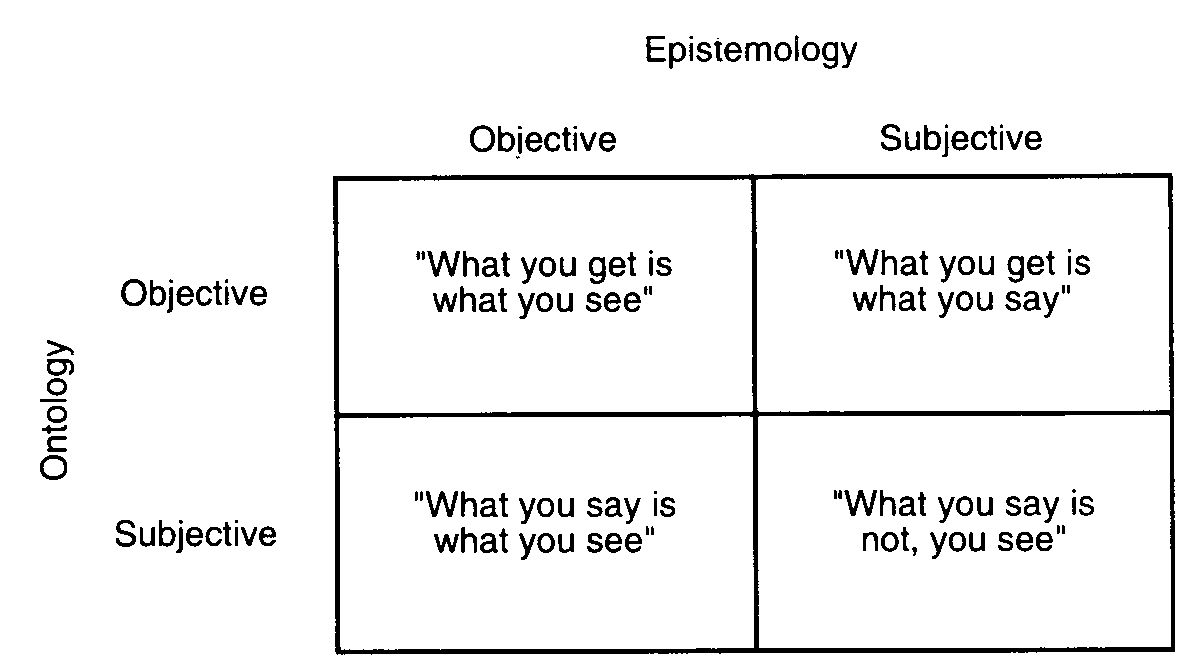Ontology and Epistemology
Ontology is the branch of metaphysics. Ontology exists since the beginning of the universe. The most famous example of Ontology and Epistemology was the dialogues of Plato and Aristotle. Ontology is the enquiry of existence. To inquire about universe, existence of God, matter, and after death happenings is some of the questions (uldaho.edu). According to Marsh et al (2002), the theory and science of being is ontology. Ontology tells us how the world has come into existence. Moreover, it also provides us the information of other world. However, its political implication is also possible because regarding the political and social contest and its nature it satisfies us (Hay, 2002). The world is always there beyond our knowledge and life exists since unknown times; however, this is one phenomenon. The other shows us that in real world is nothing instead time and culture provide a base and it is constructed obliquely and socially.
The question “What is there?” is the core concern of ontology. The relevant material regarding ontology was acquired from Aristotle and Plato’s dialogues. Aristotle defines at great length the general topic in his dissertation about things or natural things. Metaphysics, which is the source of ontology, clearly defines ontology. Therefore, to understand ontology the understanding of metaphysics is necessary. The process of thinking regarding things and defining them in words is metaphysics.
The implications of ontologies are beyond the human understanding. Presently, several breakthroughs have been observed in desktops of domain experts and Artificial-Intelligence laboratories. Moreover, the World-Wide Web is taking great advantages through the utilization of ontology. On WWW, it is being utilized to categorize large taxonomies and classifications of products to enhance their features for sale Yahoo! In addition, Amazon.com is the prominent benefiter of ontology. In addition, great work is under progress for the Resource Description Framework (Brickley and Guha 1999).
The recognition of truth and falsehood, and the means of obtaining knowledge is the core focus of epistemology. It is an investigative science. Priori and posteriori knowledge and its practice is an inseparable part of epistemology. Epistemology teaches us how we can get knowledge by simply improving our thinking. It describes how to learn things without seeing them. Therefore, epistemology is an indivisible segment of our thinking process. The opposite of epistemology is ontology. If ontology is religion, than epistemology is science. Religion describes that God exists but epistemology wants proofs, scientific and concrete, rational and logical evidence of God’s presence. Therefore, all the atheists are the great lovers of epistemology.

The role of Durkheim is very significant in the development of sociology. His social cohesion and provocative theories and his social facts concept provided a base for future research work. Durkheim differentiated sociology methodologically and theoretically from present schools of philosophy and history because they also consider social issues. His most famous theory of social facts is acknowledged globally (Durkheim 2012).
Durkheim’s renowned words are still the base of sociology’s objectivity “a matter of treating ‘social facts as things.” In other words, Durkheim suggests the sociologists to treat ‘social facts’ as facts. These facts can only be proved by empirical examination or by peripheral inspection through the utilization of statistics, legal codes indicators. Moreover, the wills of individuals and their demonstration underpinning through moral or legal rules are important for social facts. In addition, in infinite forms that composes a fixed object through a stable attribution, which facilitates the observer; thus, for personal observation or subjective impressions no room is left (Durkheim 2012).
Durkheim Emile: Edited with an Introduction Steven Lukes: Translated by W. D. Halls: The rules of sociological methods, (1982).
Emile Durkheim studied various subjects from crime and suicide, native religious totems and insignias and other phenomena to find the answer of the question what adhesive force bind together social groups and societies. Moreover, he wanted to know how people in industrial and modern societies are bound together despite they do not have acquaintance with each other. In addition, despite their social positions and experiences’ dissimilarities they are within the fold of similar society. Obviously, it is a surprising thing in a growing world of individualistic; the base of society social ties is adhered.
Conclusion
In the current essay ontology, epistemology and social facts theory of Durkheim have been discussed briefly. Ontology and epistemology are reciprocals and their utilization has increased widely in several scientific and rational sciences. Durkheim was a rationalist and great believer of epistemology; however, in later life he transformed towards ontologism.
References
Durkheim, E. (2012) The Elementary Forms Of The Religious Life. Courier Dover Publications.
Hay, Colin (2002) Political Analysis: A Critical Introduction. Basingstoke: Palgrave.
Marsh, David and Furlong, Edward (2002): ‘Ontology and Epistemology in Political Science’ in
Marsh, David and Stoker, Gerry (eds.): Theory and Methods in Political Science, 2nd edition. Basingstoke: Palgrave.
Brickley, D. and Guha, R.V. (1999) Resource Description Framework (RDF) Schema Specification. Proposed Recommendation
